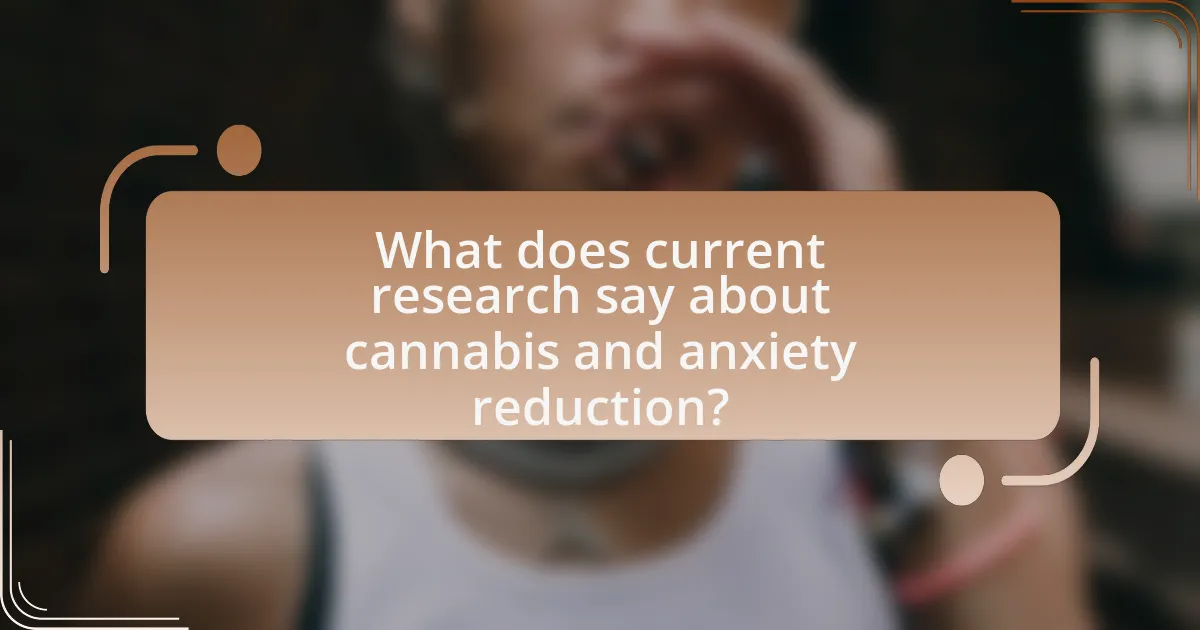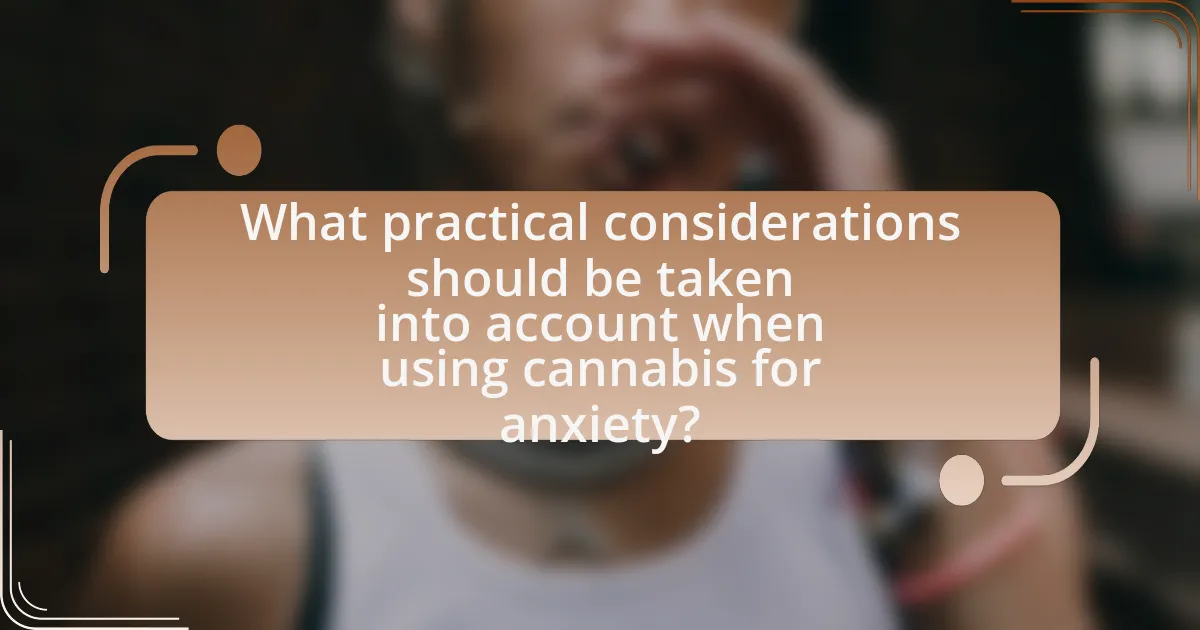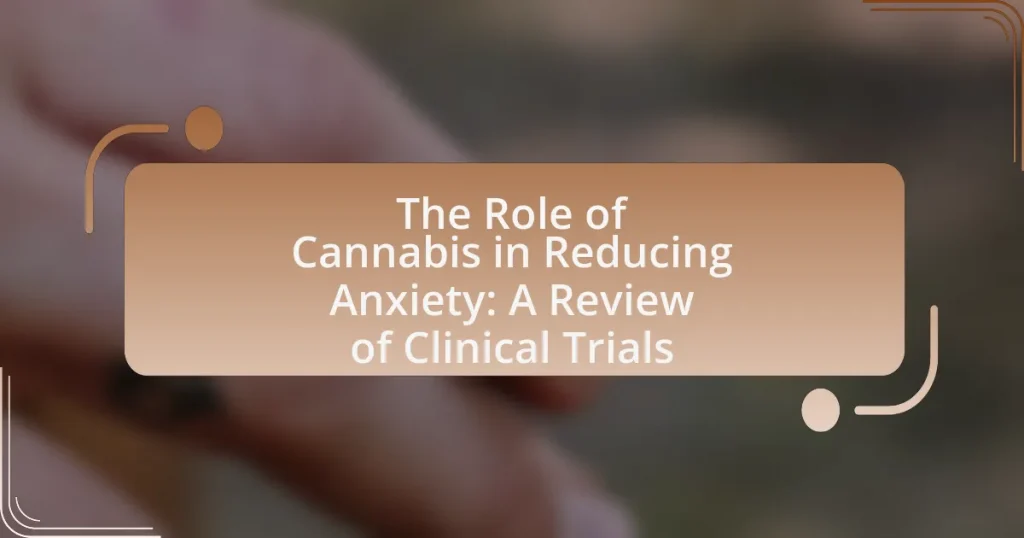The article examines the role of cannabis in reducing anxiety, focusing on clinical trials and research findings. It highlights how cannabinoids, particularly cannabidiol (CBD) and tetrahydrocannabinol (THC), interact with the endocannabinoid system to alleviate anxiety symptoms. Key studies demonstrate CBD’s anxiolytic properties, while also addressing the complexities of dosage, strain selection, and individual responses. The article further explores the potential benefits for various anxiety disorders, including generalized anxiety disorder, social anxiety disorder, and post-traumatic stress disorder, while also discussing the limitations and challenges faced in cannabis research.

What is the Role of Cannabis in Reducing Anxiety?
Cannabis plays a significant role in reducing anxiety by interacting with the endocannabinoid system, which regulates mood and stress responses. Research indicates that cannabinoids, particularly cannabidiol (CBD), can alleviate anxiety symptoms by modulating serotonin receptors in the brain. A study published in the Journal of Psychopharmacology found that CBD significantly reduced anxiety in participants with social anxiety disorder during public speaking tasks, demonstrating its potential as an anxiolytic agent. Additionally, a meta-analysis in the journal Neurotherapeutics concluded that cannabis may provide short-term relief for anxiety, although the effects can vary based on individual differences and the specific cannabinoid profile used.
How does cannabis interact with the human body to alleviate anxiety?
Cannabis interacts with the human body to alleviate anxiety primarily through its active compounds, cannabinoids, such as tetrahydrocannabinol (THC) and cannabidiol (CBD). These cannabinoids bind to the endocannabinoid receptors in the brain, particularly the CB1 and CB2 receptors, which play a crucial role in regulating mood and stress responses. Research indicates that CBD, in particular, has anxiolytic properties, as evidenced by a study published in the Journal of Psychopharmacology, which found that CBD significantly reduced anxiety in participants during public speaking tasks. Additionally, THC can produce calming effects, although it may also induce anxiety in some individuals, highlighting the importance of dosage and individual response. Overall, the interaction of cannabinoids with the endocannabinoid system contributes to the modulation of anxiety levels in users.
What are the key cannabinoids involved in anxiety reduction?
The key cannabinoids involved in anxiety reduction are cannabidiol (CBD) and tetrahydrocannabinol (THC). Research indicates that CBD has anxiolytic properties, which can help alleviate anxiety symptoms without the psychoactive effects associated with THC. A study published in the Journal of Psychopharmacology by Blessing et al. (2015) found that CBD significantly reduced anxiety in both animal and human studies. Additionally, THC may also contribute to anxiety reduction, but its effects can vary based on dosage and individual tolerance, as noted in a review in the journal Neuropsychopharmacology by Crippa et al. (2018).
How do terpenes contribute to the effects of cannabis on anxiety?
Terpenes contribute to the effects of cannabis on anxiety by interacting with cannabinoids and influencing the overall therapeutic profile of the plant. Specific terpenes, such as linalool and myrcene, have been shown to possess anxiolytic properties, which can enhance the calming effects of cannabis. Research indicates that linalool, found in lavender, can reduce anxiety-like behaviors in animal models, suggesting its potential role in alleviating anxiety when consumed with cannabis. Additionally, myrcene has been associated with sedative effects, which may further support anxiety reduction. These interactions highlight the importance of terpenes in modulating the effects of cannabis on anxiety, making them a critical component in understanding its therapeutic potential.
What types of anxiety disorders can cannabis potentially help with?
Cannabis potentially helps with several types of anxiety disorders, including generalized anxiety disorder (GAD), social anxiety disorder (SAD), and post-traumatic stress disorder (PTSD). Research indicates that cannabinoids, particularly cannabidiol (CBD), may reduce anxiety symptoms by interacting with the endocannabinoid system, which plays a role in regulating mood and stress responses. A study published in the Journal of Psychopharmacology found that CBD significantly reduced anxiety in participants with social anxiety during public speaking tasks, supporting its potential efficacy in treating social anxiety disorder. Additionally, a review in the Journal of Clinical Psychology highlighted that cannabis may alleviate symptoms of PTSD, particularly in individuals experiencing heightened anxiety and stress responses.
How does cannabis affect generalized anxiety disorder?
Cannabis can reduce symptoms of generalized anxiety disorder (GAD) by interacting with the endocannabinoid system, which plays a role in regulating mood and anxiety. Research indicates that cannabinoids, particularly cannabidiol (CBD), may have anxiolytic effects, leading to decreased anxiety levels in individuals with GAD. A study published in the Journal of Psychopharmacology found that CBD significantly reduced anxiety in participants with social anxiety disorder, which shares characteristics with GAD. Additionally, a review in the journal Neurotherapeutics highlighted that THC, another cannabinoid, can also alleviate anxiety but may induce anxiety in some individuals, indicating a complex relationship.
What is the impact of cannabis on social anxiety disorder?
Cannabis can have a mixed impact on social anxiety disorder, with some studies indicating potential benefits while others suggest risks. Research published in the Journal of Psychopharmacology by Crippa et al. (2010) found that cannabinoids, particularly cannabidiol (CBD), may reduce anxiety in social situations. Conversely, other studies indicate that high THC levels can exacerbate anxiety symptoms. A systematic review in the journal Neuropsychopharmacology by Zhornitsky and Karasinski (2018) highlights that while low doses of CBD may alleviate anxiety, higher doses or THC-dominant strains can lead to increased anxiety and paranoia. Thus, the impact of cannabis on social anxiety disorder is complex and varies based on the cannabinoid profile and dosage.
What are the mechanisms through which cannabis may reduce anxiety?
Cannabis may reduce anxiety primarily through its interaction with the endocannabinoid system, specifically by modulating neurotransmitter release. The active compounds in cannabis, particularly tetrahydrocannabinol (THC) and cannabidiol (CBD), bind to cannabinoid receptors in the brain, influencing the levels of serotonin and other neurotransmitters associated with mood regulation. Research indicates that CBD, in particular, has anxiolytic effects, as demonstrated in a study published in the Journal of Psychopharmacology, which found that CBD significantly reduced anxiety in participants during public speaking tasks. Additionally, THC may provide short-term relief from anxiety symptoms by inducing a state of euphoria, although it can also exacerbate anxiety in some individuals. Overall, the mechanisms through which cannabis reduces anxiety involve complex interactions with brain chemistry and receptor systems.
How does the endocannabinoid system play a role in anxiety management?
The endocannabinoid system plays a crucial role in anxiety management by regulating neurotransmitter release and modulating stress responses. This system consists of endocannabinoids, receptors, and enzymes that work together to maintain homeostasis in the body. Research indicates that activation of cannabinoid receptors, particularly CB1 receptors, can reduce anxiety-like behaviors in animal models, suggesting a potential therapeutic target for anxiety disorders. For instance, a study published in the journal “Neuropsychopharmacology” by Hill et al. (2018) demonstrated that enhancing endocannabinoid signaling led to decreased anxiety in rodents, supporting the idea that the endocannabinoid system is integral to anxiety regulation.
What is the significance of dosage in cannabis’s effectiveness for anxiety?
The significance of dosage in cannabis’s effectiveness for anxiety is critical, as it directly influences therapeutic outcomes. Research indicates that lower doses of cannabinoids, particularly CBD, can reduce anxiety symptoms, while higher doses may lead to increased anxiety or adverse effects. A study published in the Journal of Psychopharmacology found that a dose of 300 mg of CBD significantly reduced anxiety in participants during a public speaking test, demonstrating the importance of precise dosing for optimal results. Therefore, understanding and adjusting the dosage is essential for maximizing the therapeutic benefits of cannabis in anxiety management.

What does current research say about cannabis and anxiety reduction?
Current research indicates that cannabis may have potential in reducing anxiety symptoms. A systematic review published in the journal “Cannabis and Cannabinoid Research” in 2021, authored by Blessing et al., analyzed multiple studies and found that cannabinoids, particularly cannabidiol (CBD), showed promise in alleviating anxiety in both animal and human studies. Additionally, a clinical trial conducted by Crippa et al. in 2011 demonstrated that CBD reduced anxiety in participants with social anxiety disorder during public speaking tasks. These findings suggest that specific components of cannabis, especially CBD, could play a role in anxiety reduction, although further research is necessary to fully understand the mechanisms and efficacy.
What have clinical trials revealed about cannabis’s efficacy for anxiety?
Clinical trials have shown that cannabis can be effective in reducing anxiety symptoms. A systematic review published in the Journal of Psychopharmacology analyzed multiple studies and found that cannabinoids, particularly cannabidiol (CBD), demonstrated anxiolytic effects in both animal and human studies. For instance, a study by Blessing et al. (2015) indicated that CBD significantly reduced anxiety in participants with social anxiety disorder during public speaking tasks. Additionally, a meta-analysis in 2020 highlighted that cannabis use was associated with a reduction in anxiety levels among users, suggesting its potential as a therapeutic option for anxiety disorders.
What are the findings from recent studies on cannabis and anxiety disorders?
Recent studies indicate that cannabis may have a potential role in alleviating symptoms of anxiety disorders. For instance, a systematic review published in the journal “Neurotherapeutics” in 2020 found that cannabinoids, particularly cannabidiol (CBD), can reduce anxiety in both animal models and human clinical trials. The review highlighted that CBD has anxiolytic effects without the psychoactive properties associated with tetrahydrocannabinol (THC), making it a promising candidate for treating anxiety. Additionally, a study conducted by Blessing et al. in 2015 reported that CBD significantly reduced anxiety during public speaking tasks in individuals with social anxiety disorder. These findings suggest that specific cannabinoids may offer therapeutic benefits for anxiety disorders, warranting further research into their efficacy and safety.
How do different strains of cannabis affect anxiety levels according to research?
Different strains of cannabis affect anxiety levels variably, primarily due to their unique cannabinoid and terpene profiles. Research indicates that strains high in cannabidiol (CBD) tend to reduce anxiety, while those high in tetrahydrocannabinol (THC) can sometimes exacerbate anxiety symptoms. A study published in the Journal of Psychopharmacology by Blessing et al. (2015) found that CBD has anxiolytic effects, suggesting its potential for treating anxiety disorders. Conversely, a study in the Journal of Affective Disorders by Crippa et al. (2010) highlighted that THC may induce anxiety in some individuals, particularly at higher doses. Thus, the specific strain and its chemical composition play crucial roles in determining the impact on anxiety levels.
What are the limitations of current clinical trials on cannabis and anxiety?
Current clinical trials on cannabis and anxiety face several limitations, including small sample sizes, lack of standardization in cannabis products, and variability in dosing. Small sample sizes hinder the generalizability of findings, as seen in studies like the one conducted by Blessing et al. (2015), which reviewed only a limited number of participants. The lack of standardization in cannabis products, such as differing concentrations of THC and CBD, complicates the ability to draw consistent conclusions across studies. Additionally, variability in dosing regimens leads to inconsistent results, making it difficult to establish effective treatment protocols. These factors collectively limit the reliability and applicability of current research on cannabis as a treatment for anxiety.
What challenges do researchers face in studying cannabis for anxiety?
Researchers face significant challenges in studying cannabis for anxiety, primarily due to legal restrictions and variability in cannabis composition. Legal barriers hinder access to cannabis for research purposes, as many jurisdictions classify it as a controlled substance, limiting the ability to conduct comprehensive studies. Additionally, the variability in cannabinoid concentrations and the presence of other compounds in different cannabis strains complicate the establishment of standardized dosages and effects. This inconsistency makes it difficult to draw definitive conclusions about the efficacy of cannabis for anxiety treatment. Furthermore, the subjective nature of anxiety symptoms and the influence of individual differences in response to cannabis add another layer of complexity to research efforts.
How do varying legal statuses of cannabis affect research outcomes?
Varying legal statuses of cannabis significantly affect research outcomes by influencing the availability of study materials, participant recruitment, and regulatory oversight. In jurisdictions where cannabis is legal, researchers have greater access to high-quality cannabis products, enabling more controlled and comprehensive studies. For instance, a study published in the Journal of Psychopharmacology by Crippa et al. (2018) highlighted that legal access allows for more diverse strains and dosages to be tested, leading to more robust data on efficacy and safety. Conversely, in regions where cannabis remains illegal, researchers face challenges such as limited access to cannabis for study purposes and potential legal repercussions, which can lead to smaller sample sizes and less reliable results. This disparity in legal status directly impacts the quality and applicability of research findings in understanding cannabis’s role in reducing anxiety.

What practical considerations should be taken into account when using cannabis for anxiety?
When using cannabis for anxiety, individuals should consider dosage, strain selection, and potential side effects. Proper dosage is crucial, as higher doses may exacerbate anxiety rather than alleviate it; studies indicate that lower doses of THC can reduce anxiety, while higher doses may lead to increased anxiety and paranoia. Strain selection is also important; strains high in CBD and low in THC are generally recommended for anxiety relief, as CBD has anxiolytic properties without the psychoactive effects of THC. Additionally, users should be aware of side effects such as impaired cognitive function and increased heart rate, which can occur with cannabis use. Understanding these factors can help individuals make informed decisions about using cannabis for anxiety management.
How can individuals determine the right cannabis strain for their anxiety?
Individuals can determine the right cannabis strain for their anxiety by considering the strain’s cannabinoid profile, particularly the levels of THC and CBD. Research indicates that strains high in CBD and low in THC are often more effective for anxiety relief, as CBD has anxiolytic properties without the psychoactive effects associated with high THC levels. A study published in the Journal of Psychopharmacology found that CBD can significantly reduce anxiety in individuals with social anxiety disorder, demonstrating its potential as a therapeutic agent. Additionally, individuals should pay attention to terpenes, as certain terpenes like myrcene and linalool may enhance the calming effects of cannabis. By evaluating these factors, individuals can make informed choices about which cannabis strains may best alleviate their anxiety symptoms.
What factors should be considered when selecting cannabis products for anxiety relief?
When selecting cannabis products for anxiety relief, it is essential to consider the cannabinoid profile, particularly the ratios of THC and CBD. Research indicates that higher CBD levels can mitigate the anxiety-inducing effects of THC, making products with a balanced or higher CBD content more suitable for anxiety relief. Additionally, the method of consumption, such as vaping, edibles, or tinctures, affects onset time and duration of effects, which can influence the user’s experience. Strain selection also plays a critical role; certain strains are bred specifically for their calming effects, while others may exacerbate anxiety. Lastly, individual tolerance and personal history with cannabis should be taken into account, as responses can vary significantly among users.
How can dosage be adjusted for optimal anxiety management?
Dosage for optimal anxiety management can be adjusted by starting with a low dose of cannabis and gradually increasing it based on individual response. Clinical studies indicate that lower doses of THC (tetrahydrocannabinol) can reduce anxiety, while higher doses may exacerbate it. For instance, a study published in the Journal of Psychopharmacology found that a dose of 2.5 to 10 mg of THC was effective in reducing anxiety symptoms without significant side effects. Monitoring the patient’s response and side effects is crucial, as individual tolerance and sensitivity can vary widely. Adjustments should be made in small increments to find the most effective dose for anxiety relief while minimizing adverse effects.
What are the potential risks and side effects of using cannabis for anxiety?
The potential risks and side effects of using cannabis for anxiety include increased anxiety, paranoia, cognitive impairment, and dependency. Research indicates that while some individuals may experience relief from anxiety symptoms, others may encounter heightened anxiety or panic attacks, particularly with high-THC strains. A study published in the Journal of Psychopharmacology found that THC can induce anxiety in susceptible individuals, highlighting the variability in response to cannabis. Additionally, long-term use may lead to cognitive deficits and an increased risk of developing cannabis use disorder, as noted in a review by the National Institute on Drug Abuse.
How can cannabis use lead to increased anxiety in some individuals?
Cannabis use can lead to increased anxiety in some individuals due to its psychoactive component, THC, which can trigger heightened feelings of paranoia and anxiety. Research indicates that THC interacts with the endocannabinoid system, particularly affecting the amygdala, a brain region involved in fear and anxiety responses. A study published in the Journal of Psychopharmacology found that higher doses of THC were associated with increased anxiety levels in participants, suggesting that sensitivity to THC varies among individuals. Additionally, pre-existing mental health conditions, such as anxiety disorders, can exacerbate the anxiety-inducing effects of cannabis.
What precautions should be taken when using cannabis for anxiety relief?
When using cannabis for anxiety relief, individuals should start with a low dose to assess their tolerance and response. This precaution is crucial because cannabis can have varying effects on anxiety levels, with some users experiencing increased anxiety or paranoia, particularly with high-THC strains. Research indicates that lower doses of THC combined with CBD may provide anxiety relief without adverse effects, as shown in a study published in the Journal of Psychopharmacology, which found that CBD can mitigate anxiety symptoms without the psychoactive effects of THC. Additionally, individuals should consult with a healthcare professional before use, especially if they are taking other medications, to avoid potential interactions.
What are some best practices for integrating cannabis into anxiety management strategies?
Best practices for integrating cannabis into anxiety management strategies include starting with low doses, selecting strains high in CBD and low in THC, and consulting healthcare professionals. Low doses help minimize potential side effects, while CBD is known for its anxiolytic properties without the psychoactive effects associated with THC. Research indicates that CBD can reduce anxiety in individuals with social anxiety disorder, as shown in a study published in the Journal of Psychopharmacology, where participants reported decreased anxiety levels after CBD administration. Additionally, ongoing communication with healthcare providers ensures that cannabis use is safe and effective within a broader anxiety management plan.


